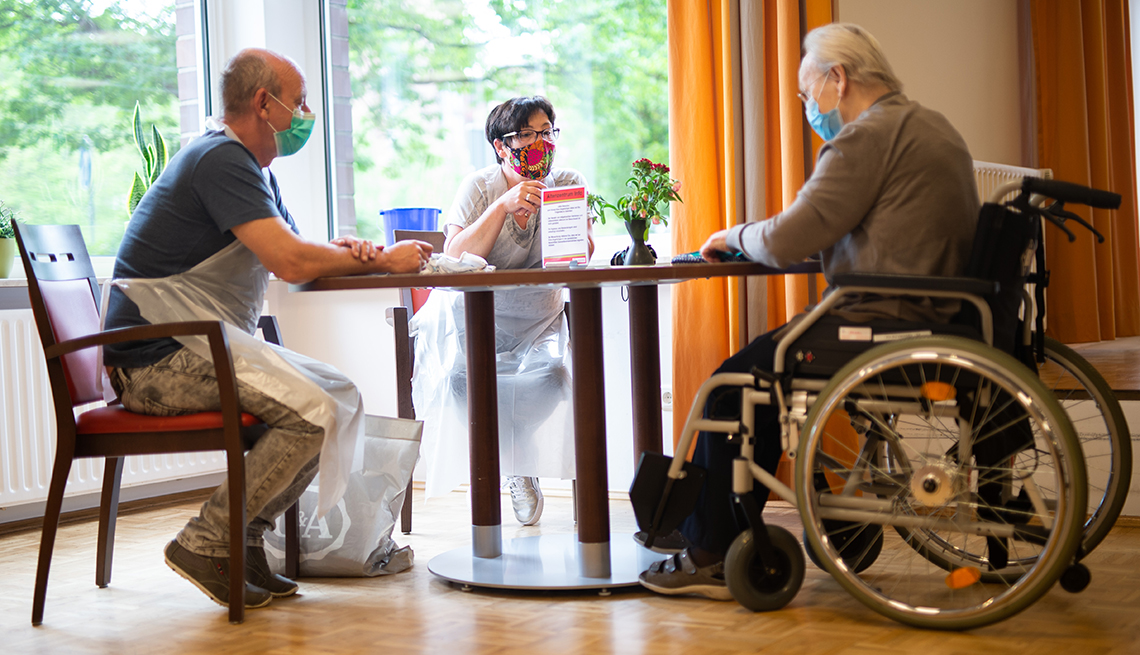
When can visitors return to nursing homes after covid-19?
- Select a language for the TTS:
- UK English Female
- UK English Male
- US English Female
- US English Male
- Australian Female
- Australian Male
- Language selected: (auto detect) - EN
Play all audios:

A number of states, including Florida, Illinois, Indiana, Minnesota, Nebraska, New Jersey, Rhode Island, South Dakota and Texas, have adopted "essential caregiver” policies. Under these
programs, nursing homes may allow greater access (for example, longer and more frequent visits) to a designated family member or other person who provides essential support to a resident,
such as help with daily living activities like eating, bathing and grooming. Talk to your loved one's facility or your local long-term care ombudsman about arranging compassionate care
visits. WHAT KINDS OF HEALTH CHECKS DO NURSING HOMES RUN ON VISITORS? As it has throughout the pandemic, the CMS continues to recommend “screening of all who enter the facility for signs and
symptoms of COVID-19,” including: * Checking visitors’ temperatures * Questioning them about symptoms and potential exposure * Observing them for any symptoms or signs of infection Entry
would be denied to anyone who has COVID-19 or symptoms of the illness or who has had close contact with a coronavirus-positive person in the previous 14 days. The newest CMS guidelines do
not require nursing home visitors to be vaccinated against COVID-19, although the agency encourages them to do so when they have the opportunity. Certain privileges may be granted to
vaccinated visitors, such as being able to unmask with a vaccinated resident in a private setting, as recommended by the Centers for Disease Control and Prevention (CDC) in late April. But
it’s likely these privileges will be offered on an honor system, given the CMS guidance says: “While visitor testing and vaccination can help prevent the spread of COVID-19, visitors should
not be required to be tested or vaccinated (or show proof of such) as a condition of visitation.” As such, the CMS guidelines also do not require visitors to get tested for COVID-19,
although the agency suggests that facilities in areas with medium or high coronavirus transmission rates offer tests on-site where feasible or encourage visitors to get tested on their own,
so that people who are infected but asymptomatic don't unknowingly infect others. This change in federal guidance has led some states, such as Maryland and New York, to drop the testing
requirements they had earlier in the pandemic as conditions of entry, although they still encourage testing prior to visiting. Alaska, on the other hand, is now requiring visitors for
unvaccinated residents to show proof of their vaccination status or of a recent negative COVID-19 test. Check where your state stands on nursing home and long-term care visitors and ask your
loved one's facility about its regulations before you show up. WILL I HAVE TO WEAR A MASK AND STAY 6 FEET FROM MY LOVED ONE? According to new recommendations from the CDC, when both
the resident and visitor are fully vaccinated (meaning both are two or more weeks past their final vaccine dose), they can unmask alone in the resident’s room or in a designated visitation
room and have close contact or touch (for example, hugging and holding hands). But don’t leave your mask at home: Visitors should wear masks at all other times during their visit and stay 6
feet from health care personnel and other residents and visitors who are not part of their group.
